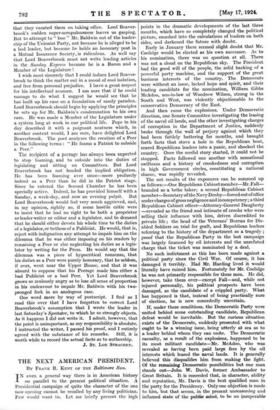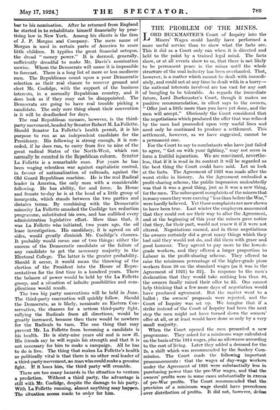THE NEXT AMERICAN PRESIDENT.
BY FRANK R. KENT OF THE Baltimore Sun.
TN even a general way there is in American history no parallel to the present political situation. A Presidential campaign of quite the character of the one now opening cannot be recalled by any living politician. Few would want to. Let me briefly present. the high points in the dramatic developments of the last three months, which have so completely changed the political picture, smashed into the calculations of leaders on both sides, and darkened the future with doubt.
Early in January there seemed slight doubt that Mr. Coolidge would be elected as his own successor. As to his nomination, there was no question at all. There was not a cloud on the Republican sky. The President had the good will of the people, the solid backing of a powerful party machine, and the support of the great business interests of the country. The Democrats were without an issue, lacked hope and spirit, and their leading candidate for the nomination, William Gibbs McAdoo, son-in-law of Woodrow Wilson, strong in the South and West, was violently objectionable to the conservative Democracy of the East.
And then came the explosions. Under Democratic direction, one Senate Committee investigating the leasing of the naval oil lands, and the other investigating charges of corruption in the Department of Justice, suddenly broke through the wall of perjury against which they had been futilely battering for months, and brought forth facts that stove a hole in the Republican boat, scared Republican leaders into a panic, and shocked the country. Once the sordid story started, it could not be stopped. Facts followed one another with sensational swiftness and a history of crookedness and corruption in high Government circles, constituting a national shame, was rapidly revealed.
The net results of the exposures can be summed up as follows:—One Republican Cabinetmember—Mr. Fall— branded as a bribe taker; a second Republican Cabinet member—Secretary of the Navy Denby forced out of office under charges of gross negligence and incompetency; a third Republican Cabinet officer—Attorney-General Daugherty —revealed as the friend and intimate of crooks who were selling their influence with him, driven discredited to private life ; the head of the Veterans' Bureau for Dis- abled Soldiers on trial for graft, and Republican leaders referring to the history of the department as a tragedy ; proof that the Republican Party in the last campaign was largely financed by oil interests and the unrefuted charge that the ticket was nominated by a deal.
No such indictment as this has been made against a political party since the Civil War. Of course, it has damaged it terribly. Had Mr. Harding lived it would literally have ruined him. Fortunately for Mr. Coolidge he was not primarily responsible for these men. He did, however, take them over—except Fall—and, while not injured personally, his political prospects have been damaged, as the candidate of a crippled party. What has happened is that, instead of being practically sure of election, he is now concededly uncertain.
If, under these conditions, the Democratic Party were united behind some outstanding candidate, Republican defeat would be inevitable. But the curious situation exists of the Democrats, suddenly presented with what ought to be a winning issue, being utterly at sea as to a leader behind whom they can unite. The Democratic casualty, as a result of the explosions, happened to be its most militant candidate—Mr. McAdoo, who was revealed as having been paid large fees by the oil interests which leased the naval lands. It is generally believed this disqualifies him from making the fight. Of the remaining Democratic possibilities but one man stands out—John W. Davis, former Ambassador to Great Britain. It is conceded that, in character, ability and reputation, Mr. Davis is the best qualified man in the party for the Presidency. Only one objection is made to him, but that seems, in the present unreasoning and inflamed state of the public mind, to be an insuperable bar to his nomination. After he returned from England he started in to rehabilitate himself financially by prac- tising law in New York. Among his clients is the firm of J. P. Morgan and Company. The mere name of Morgan is used in certain parts of America to scare little children. It typifies the great financial octopus, the dread " money power." It is deemed, generally, sufficiently dreadful to make Mr. Davis's nomination unwise. Whom the Democrats will name it is impossible to forecast. There is a long list of more or less mediocre men. The Republicans count upon a poor Democratic selection as their real chance to recover ground and elect Mr. Coolidge, with the support of the business interests, in a normally Republican country, and it does look as if they may not be disappointed. The Democrats are going to have real trouble picking a candidate. The only sure thing about their convention is it will be deadlocked for days.
The real Republican menace, however, is the third- party movement, headed by Senator Robert M. La Follette.
Should Senator La Follette's health permit, it is his purpose to run as an independent candidate for the Presidency. His following is strong enough, it is con- ceded, if he does run, to carry from five to nine of the great radical States of the North-West, which can normally be counted in the Republican column. Senator La Follette is a remarkable man. For years he has been waging relentless war against capitalistic control, in favour of nationalization of railroads, against the Old Guard Republican machine. He is the real Radical leader in America, the only man with a considerable following. He has ability, fire and force. In House and Senate to-day he is at the head of a little group of insurgents, which stands between the two parties and dictates terms. By combining with the Democratic minority La Follette smashed the Coolidge tax reduction programme, substituted his own, and has nullified every administration legislative effort. More than that, it was La Follette who initiated, two years ago, the oil lease investigation. His candidacy, it is agreed on all sides, would greatly diminish Mr. Coolidge's chances.
It probably would mean one of two things: either the success of the Democratic candidate or the failure of any candidate to get the necessary majority in the Electoral College. The latter is the greater probability.
Should it occur, it would mean the throwing of the election of the President into the House of Repre- sentatives for the first time in a hundred years. There the balance of power would be held by the La Follette group, and a situation of infinite possibilities and com- plications would result.
The two big party conventions will be held in June. The third-party convention will quickly follow. Should the Democrats, as is likely, nominate an Eastern Con- servative, the chances for a serious third-party fight, rallying the Radicals from all directions, would be greatly increased, because then there would be nowhere for the Radicals to turn. The one thing that may prevent Mr. La Follette from becoming a candidate is his health. He is sixty-nine years old and is now ill.
His friends say he will regain his strength and that it is not necessary for him to make a campaign. All he has to do is live. The thing that makes La Follette's health so politically vital is that there is no other real leader of a third-party movement, no man who could make a genuine fight. If it loses him, the third party will crumble.
There are too many hazards in the situation to venture a prediction. Without a third party, the advantage is still with Mr. Coolidge, despite the damage to his party. With La Follette running, almost anything may happen. The situation seems made to order for him.



















































 Previous page
Previous page